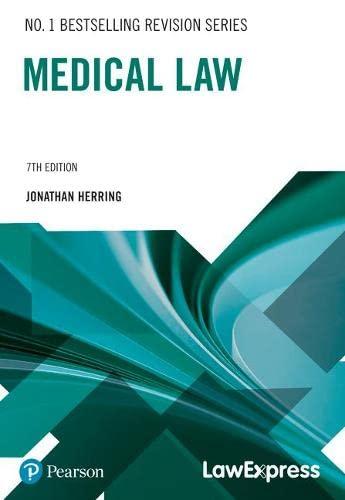Question
1. Although the First Amendment prohibits the government from establishing religion, there is no prohibition on spending money to support religious life generally. For example,
1. Although the First Amendment prohibits the government from establishing religion, there is no prohibition on spending money to support religious life generally. For example, the White House Office of Faith-based and Neighborhood Partnerships provides funding to several religious organizations, including organizations that maintain discriminatory policies toward gays and lesbians and routinely engage in proselytizing activity. Do you believe that public money should be used to fund these groups? Why or why not?
2. In 2006 Ohio passed a law requiring all public schools that receive a donation of a plaque or poster with Ohio's state motto, "In God We Trust," to display the donation prominently in a school cafeteria or classroom. Do you believe this law is a violation of the First Amendment? Why or why not?
3. During the 2004 Super Bowl halftime show, a performance by Janet Jackson and Justin Timberlake ended in a "wardrobe malfunction" when Janet Jackson's breast was exposed for a split second. CBS was fined more than half a million dollars for this violation after a record number of complaints were filed with the FCC. Do you believe that the government's action was fair?
4. In 1969 the Supreme Court ruled that school officials could not restrict students from wearing black armbands as a peace sign protesting the U.S. involvement in the Vietnam War, ruling that students do not shed their constitutional rights at the schoolhouse gates.Tinker v. Des Moines Independent Community School District, 393 U.S. 503 (1969). In 2007 the Supreme Court held that school officials could restrict students from engaging in speech that might undermine the school's zero-tolerance policy on drug use. What factors do you think might explain the Court's decisions in these two cases?
5. Try to find out if the Supreme Court has ever overturned Buck v. Bell. Do you believe that an attempt by the state to force sterilization on mentally disabled women would survive a due process challenge today? If the government is permitted to force sterilization, does that mean that the government also has the power to force women to have children if it can articulate compelling enough reasons to do so?
6. Laws discriminating on the basis of age fall into the minimal basis scrutiny category. A state that wishes to raise the drinking age to twenty-five or the driving age to twenty, for example, needs to put forward only a rational basis for that law. Do you believe that age should fall into this category or into one of the other two categories for heightened review?
7. Do you believe that public universities should be able to consider race as a factor in deciding whether or not to admit a student? If a university is unable to consider race, how else might it design an admissions program to achieve a diverse classroom? What would have been the impact if the Grutter case had been decided in favor of the plaintiff
Step by Step Solution
There are 3 Steps involved in it
Step: 1

Get Instant Access to Expert-Tailored Solutions
See step-by-step solutions with expert insights and AI powered tools for academic success
Step: 2

Step: 3

Ace Your Homework with AI
Get the answers you need in no time with our AI-driven, step-by-step assistance
Get Started


